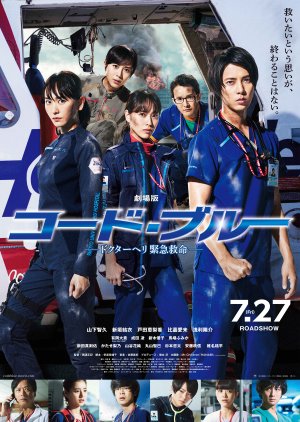
Wrap up of the entire series
First of all, I highly recommend watching Code Blue in the right order. From season 1 to the movie which is the official end, this series has a red thread going through.The order of watching is:
Code Blue Season 1 (2008)
Code Blue Special (Farewell Facing Tomorrow) (2009) (connects Season 1 and 2)
Code Blue Season 2 (2010)
Code Blue Season 3 (2017)
Code Blue: Another Everyday (Spin-Off) (2018)
Code Blue Mou Hitotsu No Senjou Special (2018) (Sequel and bridge to movie)
Code Blue: The Movie (2018)
The Movie is the last adaption and tells the story of the flight doctors until their future paths.
Maybe the story is a bit dramatic but it's not getting to a point of being ridiculous or unrealistic for me. Also from scriptwriters/production point of view it's understandable they want to fill in action and some "blasts" before the end.
I can hardly even think of anything negative because I liked the series from the beginning and the script convinced me.
The drama has a good balance between personal life (and struggles) of the characters and the medical part (which is well written). Not to mention, that the medical accuracy is given here, which I appreciate a lot because I can't stand when even basic things like CPR are portrayed wrong in dramas. Doctors are not "gods in white" in this but they have insecurities, private matters and other problems they have to deal with. Code Blue managed to show the progress of the main characters and how they grow from the fresh trainees to full-fledged doctors that people and fellow trainees now depend on. This depth is a bit shortcut in the movie (due to it's limited runtime) but it's there if you followed the series.
The cast is mostly the same minus some faces we have seen in Season 3. The focus of this movie is on the "main 5" (Shiraishi, Aizawa, Hiyama, Fujikawa and Saejima). All did a wonderful job in portraying their character.
As for the music, you either grew tired of the same tunes by now or they've grown to you. For me it's the second and whenever I hear the melodies, I think of Code Blue.
The movie as the entire series have a high rewatch value. I loved to watch the development of the characters. The medical part is good, the characters likeable, there's a bit of humor and romance. Overall a nice package that will entertain you.
Cet avis était-il utile?

Cette critique peut contenir des spoilers
A modo de conclusión de la saga de Code Blue, la película tiene de todo: drama lacrimógeno, acción médica de primera en rescates durante dos accidentes de gran escala, comedia (voluntaria o involuntaria) y un poco de romance para aderezar la historia de nuestros cinco protagonistas.En torno a la demostración en vivo de la extracción de un aneurisma en el hemisferio cerebral izquierdo por parte del neurocirujano Shinkai, para la Universidad de Toronto a donde se fue Aizawa, sucede una emergencia en el aeropuerto de Narita, un avión enfrentó turbulencia y aterrizó de emergencia pero hay un montón de heridos; por supuesto el equipo de rescate a cargo de Shiraishi va en su auxilio con el Dr. Heli, acompañada de Saejima y el asustadizo Haitani pero sorprendentemente alguien más ya hizo un triage (evaluación y clasificación médica de los heridos), ¿será posible?
¡Sí!, en una entrada de lo más triunfal, aparece Aizawa quien viaja de vuelta para ver la dichosa cirugía, pero se queda atascado atendiendo pacientes porque es su trabajo.
A raíz de este incidente comienza una de las historias paralelas que va enmarcando la situación entre Fujikawa y Saejima respecto a su boda; una paciente con cáncer terminal de estómago llega a Shohoku por lesiones durante la turbulencia aérea, ya en el hospital se descubre que esta chica (Tomizawa Michi) iba a casarse y de pronto brotó su enfermedad en sus manos y su prometido (Iwata -akio, protagonizado por Arata Mackenyu) huyo, pero va a verla y le dice que después de todo deberían casarse.
La siguiente historia relacionada con los protagonistas es la historia de la madre de la novata enfermera Yukimura, una mujer alcohólica que llega a emergencias de la forma más singular: con un cuchillo en la cabeza. Ahí descubres que Futaba Yukimura decide dejar a su familia atrás para convertirse en una enfermera, pero al dársele el diagnóstico de su madre confronta a Aizawa diciéndole que "él no podría entenderla", sin conocer la historia familiar de nuestro protagonista, a la que se ve expuesta por cierto suceso...
Y la más lacrimógena, a mi gusto, se da durante el segundo rescate que llevan a cabo en el choque de un ferry contra un muelle, obvio hay un montón de heridos y de casos cardiacos como el del hombre atrapado en un auto, con un tubo de hierro atravesándole el abdomen, al que Shiraishi, Aizawa y Yukimura rescatan de forma bastante arriesgada; la historia en cuestión es sobre un muchacho de instituto que es rescatado mientras flotaba en el océano, con muerte cerebral y con el último deseo de ser donante de órganos aunque sin la edad legal para poder serlo, dejando a sus padres con la difícil decisión, y al doctor Haitani con la dolorosa asesoría...
En realidad una película excelente, en la que nos muestran más sobre la dinámica entre nuestros protagonistas al momento de enfrentare a situaciones peliagudas y rescates arriesgados, sin dejar de lado su parte humana.
Cet avis était-il utile?



































